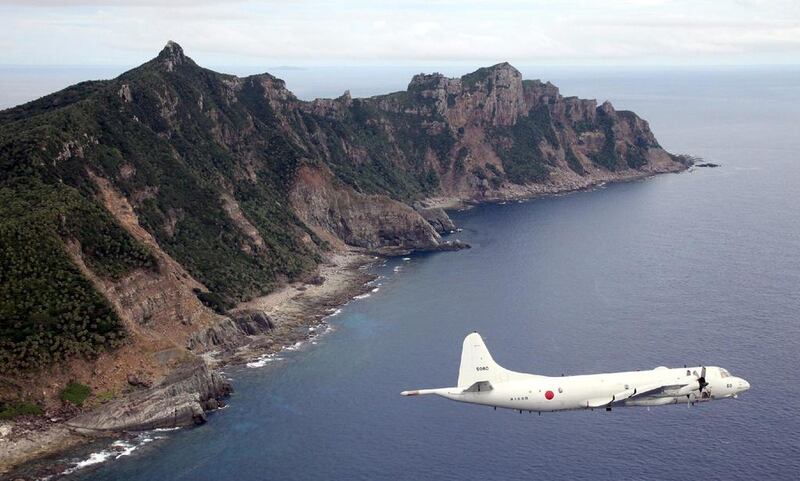A failure to come to terms with history weighs down several important international relationships in Asia. As the 70th anniversary of the end of the Second World War approaches, some Asian nations are busy resurrecting the ghosts of history.
China, for example, is planning a grand military parade in Beijing on September 3 to commemorate what it calls “Victory over Japan Day”, or the end of the Second World War. The People’s Daily, the official newspaper of China’s government, has said the parade is intended to display China’s military prowess and “make Japan tremble”.
How diplomatic relationships remain hostage to history is best exemplified by the strained ties between South Korea and Japan, America’s closest regional allies. Following Japanese prime minister Shinzo Abe’s re-election, these two countries face a stark choice: find ways to stem the recurrence of bitter disputes over history or stay locked in a frozen political relationship.
Few countries like to play the history card more than China, as illustrated by its recent declaration of two new national days to remember Japanese aggression.
Although history is never an objective chronicle, it greatly shapes national narratives. In Asia, the “history problem” has spurred a resurgence of competing and mutually reinforcing nationalism.
In fact, several Asian countries use history selectively to promote national agendas geared towards whitewashing their past aggressions or reinforcing their victimhood narrative. Squabbles over history and remembrance remain the principal obstacle to political reconciliation in Asia, reinforcing negative stereotyping of rival nations and helping to rationalise claims to territories long held by other nations.
Honouring one country’s heroes and history can be done without seeking to alienate, provoke or rub salt in the wounds of another nation. In an economically integrating but politically divisive Asia, however, politics remains trapped in a mutually reinforcing loop: poor political relations magnify and accentuate the history problem, thus reinforcing inter-state relationships being held hostage to history. Breaking out of such a vicious circle demands forward-looking leadership and political reconciliation. At present, though, the trend is different. For example, attempts to rewrite or sugarcoat history, including by revising textbooks or putting up memorials for newfound heroes, are promoting greater rancour and recrimination.
South Korean-Japanese and Chinese-Japanese disputes over territories, war memorials, textbooks and natural resources are linked with history. The Sino-Indian relationship is also a prisoner of past disputes. Even the Chinese-Korean relationship carries the baggage of history, as underscored by China’s claim to the ancient kingdom of Koguryo, founded in the Tongge River basin of northern Korea.
The recent commitment of US president Barack Obama and Indian prime minister Narendra Modi to work with like-minded countries to build power equilibrium in Asia can make little headway if history remains a barrier to improved relations.
Take Japan and South Korea: as export-orientated powerhouses with traditionally close cultural ties, the two share many values. But resurgent history issues between them have put paid to hopes for a concert of democracies to rein in China’s assertiveness.
Again, take the century-old case of a Korean activist, Ahn Jung-geun, illustrates history’s divisive power. A terrorist to Japan (which hanged him) but a hero to South Korea, Ahn assassinated Japan’s first prime minister, Hirobumi Ito, in 1909 at the Harbin city railway station in China.
The case has resurfaced with a vengeance after Chinese president Xi Jinping, heeding South Korean president Park Geun-hye’s request, built a memorial eulogising Ahn, prompting Japan to denounce China for glorifying a terrorist. That memorial has been likened by some to building a statue in Dallas to John F Kennedy’s killer, Lee Harvey Oswald.
South Korea, seeking to exalt the Korean people’s past, has systematically eliminated the last vestiges of Japanese colonial rule. But not all Asian states seek to obliterate their colonial past. India continues to transact much of its key government business from British-colonial-era edifices, while Taiwan – a former Japanese colony – also has a forbearing view of its imperial subjugation.
Many nations, however, blend historical fact with myth. Harmful historical legacies create serious impediments to rational policy choices. Ms Park, for example, has sought closer ties with China when South Korea’s natural regional partner is Japan. Since coming to power two years ago, she has not held a single formal meeting with Mr Abe, insisting that Japan first address lingering issues over its annexation of Korea.
Mr Abe’s re-election places him on strong political ground to reach out to Ms Park and find ways to put history behind them through a grand bargain. This would involve Japan more clearly expressing its regret and remorse over its militaristic past and South Korea agreeing not to rake up historical grievances.
Asian states cannot change their past but they can strive to shape a more cooperative future. As a Russian proverb puts it pithily: “Forget the past and lose an eye; dwell on the past and lose both eyes.”
Brahma Chellaney is an author and professor





